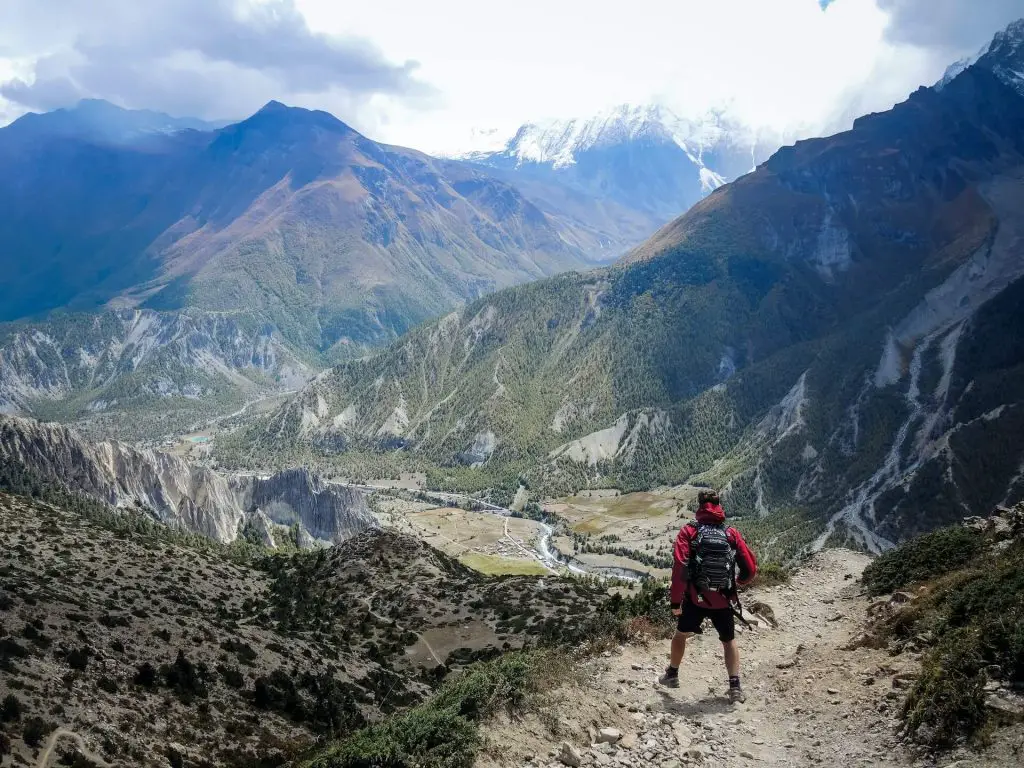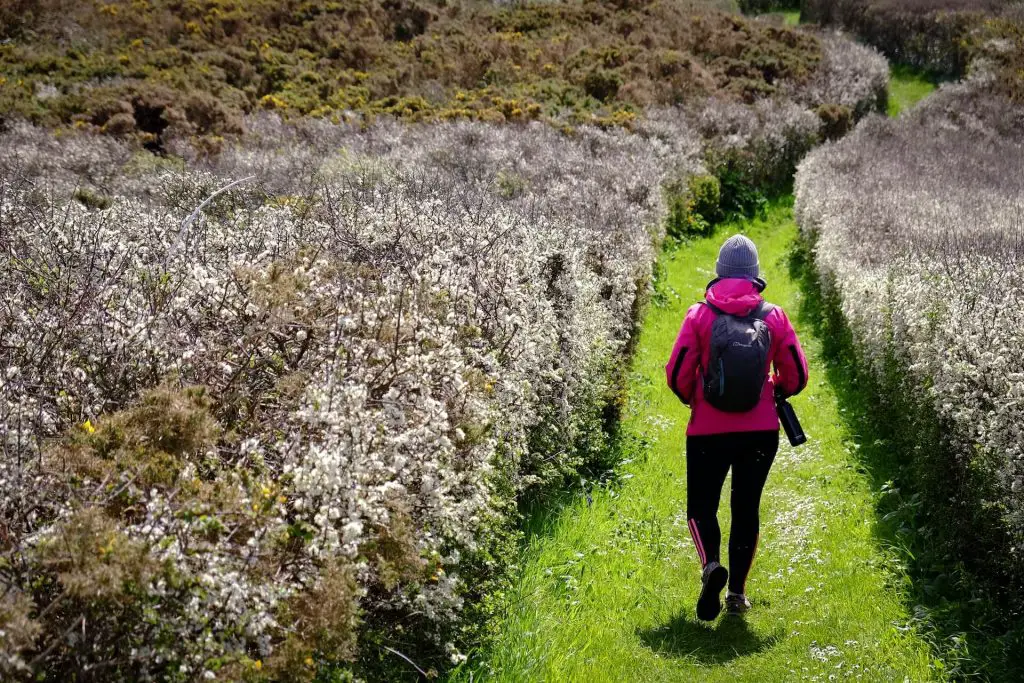
As you research your upcoming hike and plan the logistics you probably just came across an enticing 7 mile hike. Trying to estimate how long a hike can take can be tricky with so many variables. It might be a new trail with unknown terrain, there can be very steep sections, and maybe this is your first time back on the trail in a while. How can you know how long it takes to hike 7 miles?
The average person can hike between two to three miles per hour, so depending on fitness level, trail conditions, and weather, the average hiker a 7 mile hike will take around 3 and a half hours. Also, for the average person you can add an additional fifteen minutes for every 500 feet of elevation gain for more strenuous hikes.
Being able to estimate how long your upcoming hikes is an important skill. Knowing how external factors such as elevation, temperature, weather, and trail conditions can slow you down is also crucial in being able to better estimate your hiking time. I’ve seen trail signs that estimated a two hour hike, but on the day of our hike we encountered muddy and wet conditions which slowed us down drastically. Once you know which external factors impact you the most there are also some things you can do to help maintain a good pace on your hike.
Seven Mile Hike Times
| Hike Type | Elevation Gain | Duration |
|---|---|---|
| Downhill | -250 ft | 3 Hours 15 Mins+ |
| Flat | 0 ft | 3 Hours 30 Minutes+ |
| Gradual | 500 ft | 3 Hour 45 Mins+ |
| Steep | 1,000 ft | 4 Hours+ |
| Very Steep | 1,500 ft+ | 4 Hours 15 Mins+ |
| Extremely Steep | 2,000 ft+ | 4 Hours 30 Mins+ |
Factors that Can Slow Down Your Hike
Fitness Level
While our estimate references the average time, the main thing that will impact your estimate is your current fitness level. Whether you are just getting back into the swing of things or you have been hiking for the past few weeks, your fitness level will largely dictate how fast you will be hiking. Estimating your hike time isn’t an exact science and your goal should be to get a close enough estimate so you can safely plan your hikes.
If you are just starting out then its better to estimate more conservatively that you are hiking between 1.5 miles to two miles per hour. If you feel like you’ve been hiking a bunch and are confident then you can estimate at a faster pace between 2 to 2.5 miles per hour. I typically tend to plan for a slower pace so that I give myself extra time on my hike, that way I don’t over estimate and accidentally run out of daylight.
Elevation
The next factor that will slow you down on your hike is elevation. When you research hikes online they have a rating from easy to very strenuous. This rating is typically based on how much elevation gain a trail will cover. The more elevation gain, the more pain for your legs. Hiking a flat four mile hike is much easier than a very steep two mile hike.
As you find more hikes and look at the elevation gain, you can also look for certain mile markers that start the beginning of a tough uphill stretch. With this knowledge on hand you can strategically plan your breaks. Alongside elevation gain another important factor is altitude. You should be mindful of the starting altitude and ending altitude. Having large gains in a short amount of time can be very straining on the body. IF you are hiking over 6,000 feet then you can have difficulty breathing as the higher you go up the less oxygen is available for you.
Temperature
Another key factor to think about is the weather and temperatures for the day. Try to plan your 7 mile hike during the cooler parts of the day. Typically the earlier you start the better as the sun is usually the hottest around noon to three o’clock. Hiking at cooler temperatures will help you stay cooler and feel more comfortable during your hike. You will be able to keep a better pace if you are cool and not hot and sweaty.
Once you have your hike time planned you should also watch out for the weather. Sunny skies sounds good at first, but if there is no shade on the trail then that is something you should prepare for. If there’s rain then bring a rain poncho or rain gear to help keep yourself dry. Having bad weather can slow you down drastically such as strong rains or deep snow.
Frog Togg Ultra Lite Rain Poncho on Amazon
Trail Conditions
Once you have the weather and temperature down the next factor to look into is condition of the trail. Hiking on a trail covered in debris, mud, or snow can greatly slow you down. There are a few ways to check trail conditions before your hike so you can be better prepared on what to expect. The first thing you can do is read any recent alltrails trip reports. People tend to write about things that block them or issues they encountered. This is a good start if there are recent trail reviews.
Another way you can visually see parts of the trail is to check Instagram hashtags or tagged locations of your trail. This way you can see other hikers that have posted photos of their hike. The third way you can check trail conditions is to call the local ranger station. Rangers are responsible for patrolling the trails to check on certain locations and help hikers, so they have the best and most reliable insights on trail conditions. Knowing trail conditions is really important if you want to accurately estimate your 7 mile hike time.
Factors that Can Help You Keep A Good Pace

Breaks
Now that you know some major external factors that can slow you down, there’s things that are in your control that can help you maintain a good hiking pace. The first thing you can do is determine how long your breaks are and to decide how often to take breaks. Strategically timing your hikes right before very steep sections can help you get rested so you can power through and make your way up steep sections of the trail
Also determining how long your breaks are is important so that you do not lose momentum and take breaks that are too long, however you also don’t want to try to skip breaks if you are getting back into hiking as you can tire your legs out quickly. As you hike more hikes you will be able to find a good balance of how long to take breaks and how often.
Hydration
The next thing you can do is make sure you are properly hydrated. I’ve been on hikes where I get in the zone and completely forget to drink water during the hike. After about an hour in I am usually completely gasses and wondering why I am going so slow. To help maintain a good pace just take a few sips of water every now and then to make sure you are properly hydrating your body. This makes a huge difference over long hikes so your body can maintain its pace. I’ve always just used my Platypus hydration bladder so I don’t have to stop and open a bottle of water and am able to drink directly from a hose.
Platypus Big Zip EVO Reservoir on Amazon
Sun Protection
Another thing in your control is to have proper sun protection. If the sun is beaming down on you and you have no protection it can slow you down a lot. The suns heat can sap your energy and lower your morale over a long period of time. Its important to bring a hiking hat, sunglasses, and maybe even long sleeves to help keep the sun off of you. Having these things will help you stay cooler and help you enjoy the hike more.
Final Thoughts
Estimating your upcoming 7 mile hike can be understandingly confusing with so many variables to account for. Its better to be more conservative and estimate an average hiking pace so you can plan your hike more safely. This will give you a solid buffer for your planning. If you hike faster than you estimate then its fine cause you will be hiking at the cooler parts of the day and you have more hours until nightfall. Now that you know the main factors that can slow you down such as fitness level, elevation, trail conditions, weather and temperature, you can have a better framework to estimate your future hikes.
Once you have those factors down you now know that strategically planning breaks, taking intermittent sips of water, and having solid sun protection will also make a big difference in your hiking time. Estimating hike times isn’t an exact science, but the more hikes you do the more you will understand how your body reacts to all of these elements. Enjoy your 7 mile hike!
